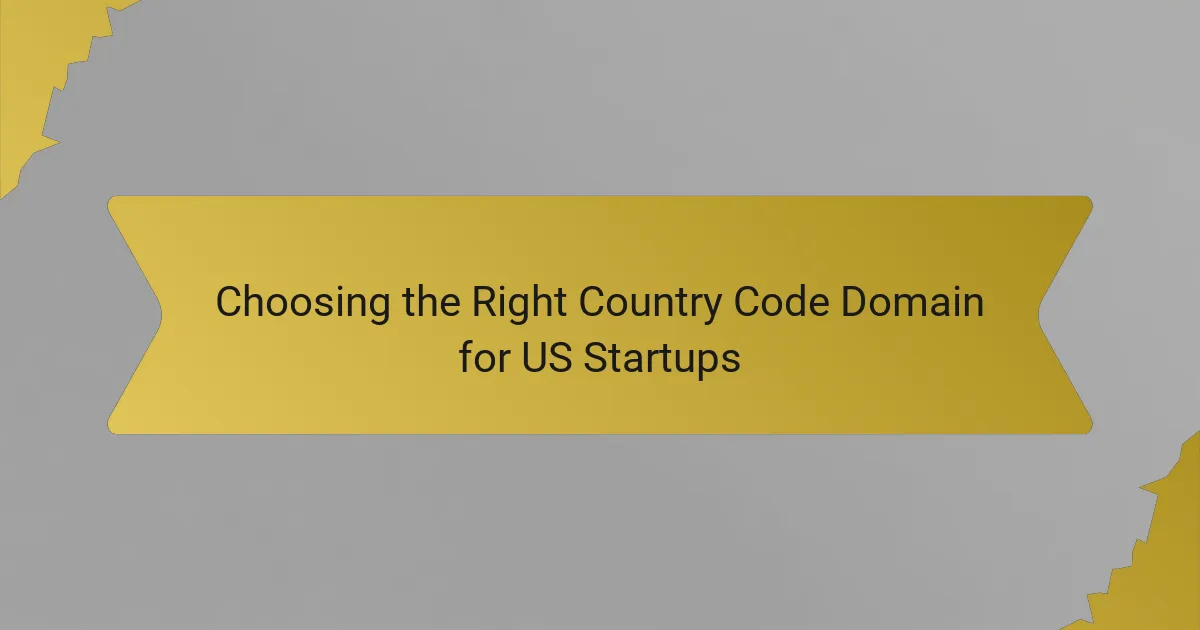Choosing the right country code domain is essential for US startups looking to enhance their online presence and brand identity. Options like .us, .co, .io, and .me each offer distinct advantages that can improve search visibility and audience engagement. By considering factors such as target audience, brand alignment, and legal implications, startups can make informed decisions that positively impact their growth and customer trust.

What are the best country code domains for US startups?
The best country code domains for US startups include .us, .co, .io, and .me. Each of these options offers unique advantages that can enhance branding, market positioning, and audience engagement.
.us domain advantages
The .us domain is specifically designed for entities in the United States, making it an excellent choice for startups targeting a domestic audience. It signals a commitment to the local market, which can foster trust among American consumers.
Using a .us domain can also improve search engine optimization (SEO) for local searches, as search engines may prioritize local domains in relevant queries. This can lead to increased visibility and traffic for your startup.
.co domain popularity
The .co domain has gained significant popularity among startups and entrepreneurs as a global alternative to .com. It is often associated with “company” or “corporation,” making it a versatile choice for various business types.
Many startups prefer .co because it is short, memorable, and widely recognized. However, it is essential to ensure that the .co domain you choose is not confused with similar .com domains to avoid potential brand dilution.
.io domain tech appeal
The .io domain has become a favorite among tech startups and companies in the software industry. It is often associated with input/output, which resonates with tech-savvy audiences and innovators.
While .io domains can be more expensive than traditional options, their appeal in the tech community can enhance brand identity and attract a niche audience. Startups should consider their target market when choosing this domain to ensure it aligns with their brand image.
.me domain for personal branding
The .me domain is ideal for personal branding and individual entrepreneurs looking to establish a strong online presence. It conveys a personal touch, making it suitable for freelancers, consultants, and creatives.
Using a .me domain can help differentiate your personal brand from competitors and create a memorable web address. However, it’s crucial to ensure that the content and messaging on the site reflect your personal brand effectively to maximize its impact.
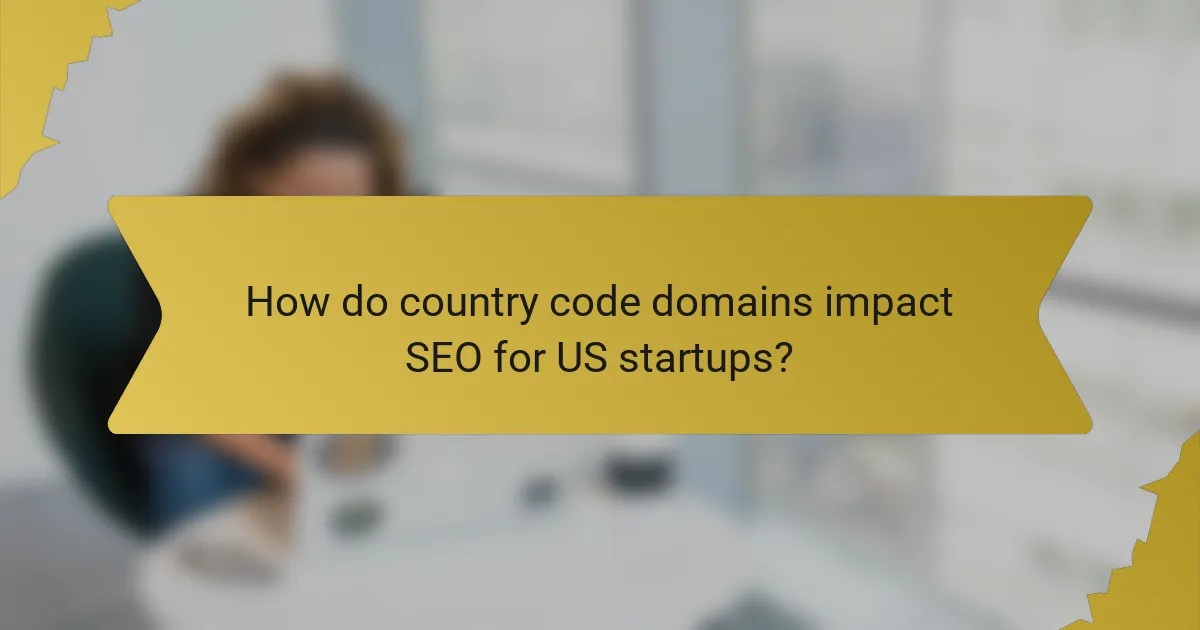
How do country code domains impact SEO for US startups?
Country code domains can significantly influence SEO for US startups by affecting search visibility and local relevance. Choosing the right domain can enhance local search rankings and improve user trust, which are crucial for attracting and retaining customers.
Localized search rankings
Using a country code domain, such as .us or .co, can help improve localized search rankings. Search engines often prioritize domains that match the user’s geographical location, making it easier for local customers to find your business. For instance, a startup with a .us domain may rank higher in searches conducted within the United States compared to a generic .com domain.
To maximize localized SEO benefits, ensure that your website content is tailored to the local audience. Incorporate local keywords, references, and even regional dialects to resonate with users. This approach can further enhance your visibility in local search results.
Domain authority considerations
Domain authority is a critical factor in SEO, influencing how well your site ranks in search results. While country code domains can boost local relevance, they may not carry the same authority as established generic domains like .com or .org. Startups should consider building backlinks from reputable sources to enhance their domain authority over time.
It’s essential to balance the choice of a country code domain with strategies to improve overall authority. Focus on creating high-quality content, engaging with your audience on social media, and collaborating with other local businesses to strengthen your online presence. Avoid common pitfalls, such as neglecting mobile optimization, which can hinder your SEO efforts regardless of the domain type.

What factors should US startups consider when choosing a country code domain?
US startups should consider factors such as their target audience location, brand identity alignment, and legal implications when selecting a country code domain. These elements can significantly impact online visibility, customer trust, and compliance with local regulations.
Target audience location
Understanding where your target audience is located is crucial for selecting an appropriate country code domain. If your primary customers are in a specific country, using that country’s domain can enhance local relevance and trust. For example, a startup targeting customers in Canada might benefit from a .ca domain.
Additionally, consider the potential for expansion. If you plan to grow into international markets, a more globally recognized domain like .com may be advantageous, but a country-specific domain can still be effective for localized marketing efforts.
Brand identity alignment
Your brand identity should resonate with your chosen country code domain. A domain that reflects your brand’s mission and values can strengthen customer connections. For instance, a tech startup focused on innovation might choose a .tech domain, while a business emphasizing local roots might opt for a .us or .nyc domain.
Ensure that the domain aligns with your overall branding strategy. A mismatch can confuse customers and dilute your brand message. Conducting market research can help determine which domain resonates best with your audience.
Legal implications
Legal considerations are vital when choosing a country code domain. Different countries have varying regulations regarding domain registration, including eligibility and usage restrictions. For example, some country code domains require local presence or business registration.
Be aware of trademark laws as well. Registering a domain that closely resembles an existing trademark can lead to legal disputes. It’s advisable to conduct thorough research and possibly consult with a legal expert to ensure compliance with local laws and to protect your brand.

How can US startups leverage country code domains for marketing?
US startups can effectively use country code domains (ccTLDs) to enhance their marketing efforts by targeting specific regional markets and differentiating their brand. By selecting a ccTLD relevant to their audience, startups can improve local visibility and credibility, making it easier to connect with customers in those areas.
Regional targeting strategies
Utilizing ccTLDs allows startups to tailor their marketing strategies to specific regions. For instance, a startup aiming to enter the Canadian market might choose a .ca domain, signaling to local consumers that they are relevant and accessible. This can lead to higher engagement rates and improved trust among potential customers.
Startups should consider the cultural and linguistic nuances of their target regions when selecting a ccTLD. For example, a business targeting Spanish-speaking customers in the U.S. might benefit from a .mx domain, which can resonate more effectively with that demographic. Researching local preferences can guide domain selection and marketing approaches.
Brand differentiation
Choosing a ccTLD can help a startup stand out from competitors by reinforcing its brand identity. A unique domain extension can convey a sense of local expertise and commitment to the market, which is especially valuable in crowded industries. For example, a tech startup in Germany might choose a .de domain to emphasize its local presence.
Additionally, ccTLDs can enhance search engine optimization (SEO) for local searches. Search engines often prioritize local domains in their results, making it easier for potential customers to find relevant businesses. Startups should ensure their website content aligns with local interests and trends to maximize this advantage.
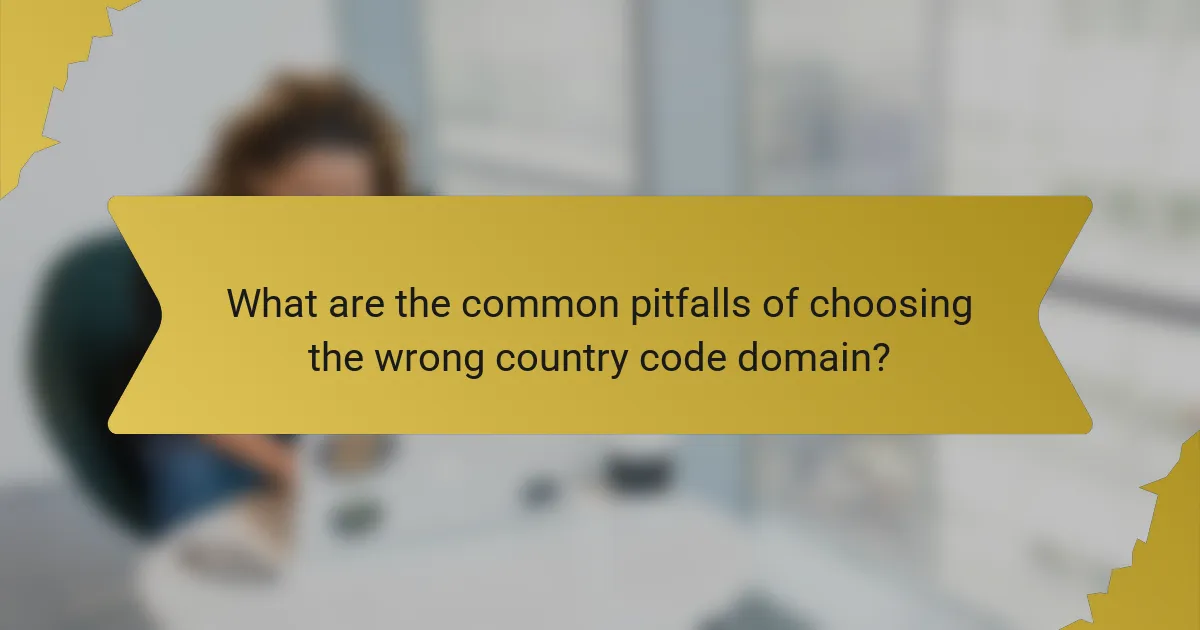
What are the common pitfalls of choosing the wrong country code domain?
Choosing the wrong country code domain can lead to significant issues for US startups, including brand confusion and SEO penalties. Selecting an inappropriate domain may mislead customers about the business’s location and target market, ultimately affecting credibility and online visibility.
Brand confusion risks
Using a country code domain that does not align with your target audience can create brand confusion. For instance, a US-based startup using a .fr domain may lead customers to believe the business is French, which can deter potential clients who prefer local services.
To avoid this pitfall, ensure your domain reflects your primary market. If your startup primarily serves US customers, opt for a .com or .us domain to reinforce your brand identity and avoid misleading associations.
SEO penalties
Choosing the wrong country code domain can result in SEO penalties, as search engines may prioritize local domains for specific geographic searches. For example, a .uk domain may rank lower in US search results, making it harder for potential customers to find your business online.
To optimize your SEO strategy, select a domain that matches your target market’s location. Additionally, consider using local hosting services and optimizing your website’s content for US-based keywords to enhance visibility in search engine results.
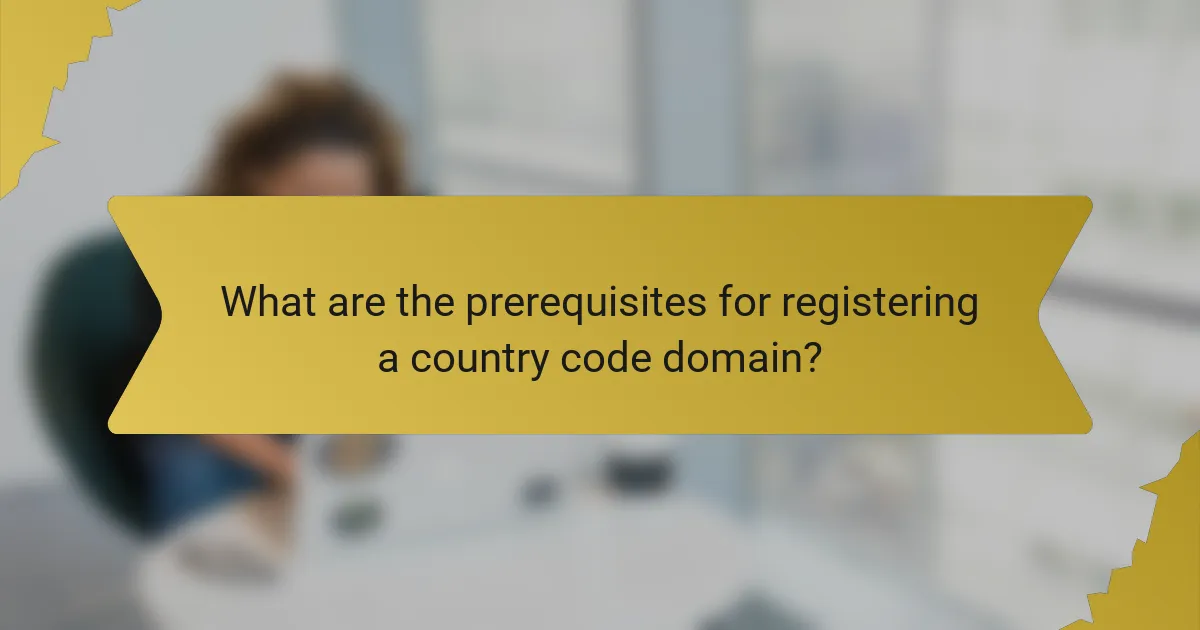
What are the prerequisites for registering a country code domain?
To register a country code domain, you typically need to meet specific eligibility criteria set by the domain’s governing authority. These requirements can vary by country but often include having a local presence or fulfilling certain business conditions.
Eligibility requirements
Eligibility requirements for country code domains often include being a resident or having a business presence in the respective country. For instance, many European country code domains require proof of a registered business or a local address.
Additionally, some domains may have restrictions based on the type of entity applying, such as individuals, corporations, or non-profits. Always check the specific rules for the country code you are interested in to ensure compliance.
Registration process overview
The registration process for a country code domain generally involves selecting a domain name, verifying eligibility, and completing the application through an accredited registrar. Most registrars provide an online platform to facilitate this process.
After submitting your application, you may need to provide documentation to prove your eligibility. The approval time can vary, ranging from a few hours to several days, depending on the country and registrar.
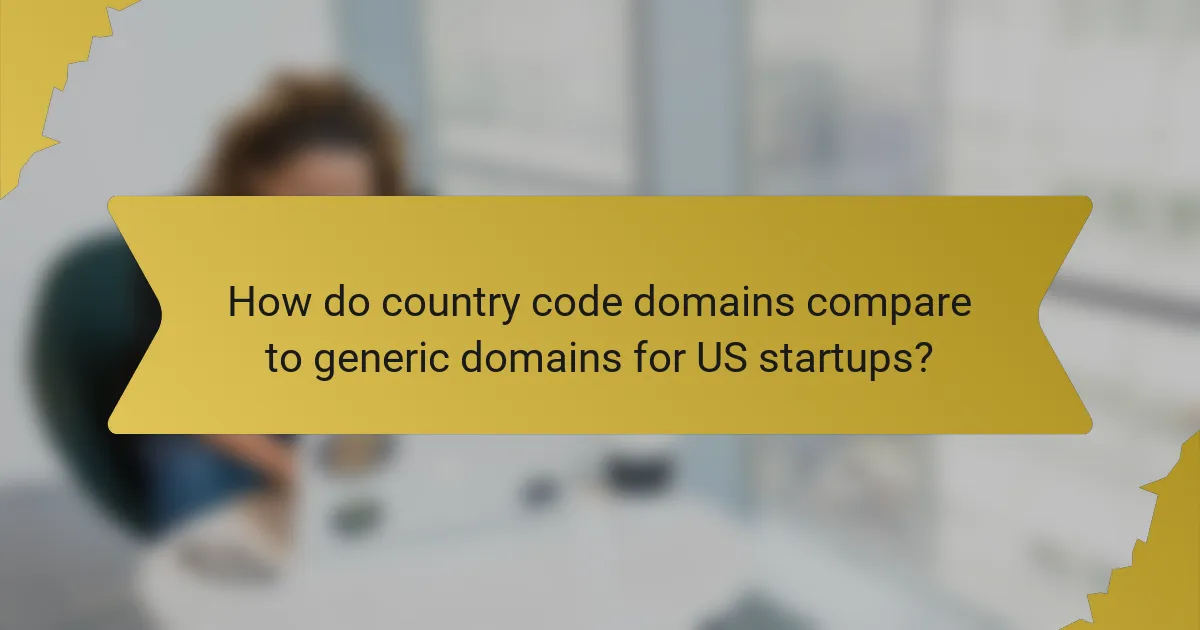
How do country code domains compare to generic domains for US startups?
Country code domains (ccTLDs) can offer unique advantages over generic domains (gTLDs) for US startups, particularly in terms of local relevance and brand positioning. While gTLDs like .com or .net are widely recognized, ccTLDs such as .us or .co can enhance trust and connection with specific audiences.
Brand recognition differences
Brand recognition can vary significantly between country code domains and generic domains. Generic domains are often seen as more universal and can appeal to a broader audience, while ccTLDs can create a sense of local identity and trust among regional customers.
For example, a startup using a .us domain may be perceived as more credible by American consumers compared to a .com domain. This local touch can be particularly beneficial for businesses targeting specific states or communities within the US.
However, startups should consider their target market when choosing a domain. If the goal is to expand internationally, a generic domain might be more advantageous for global brand recognition.
